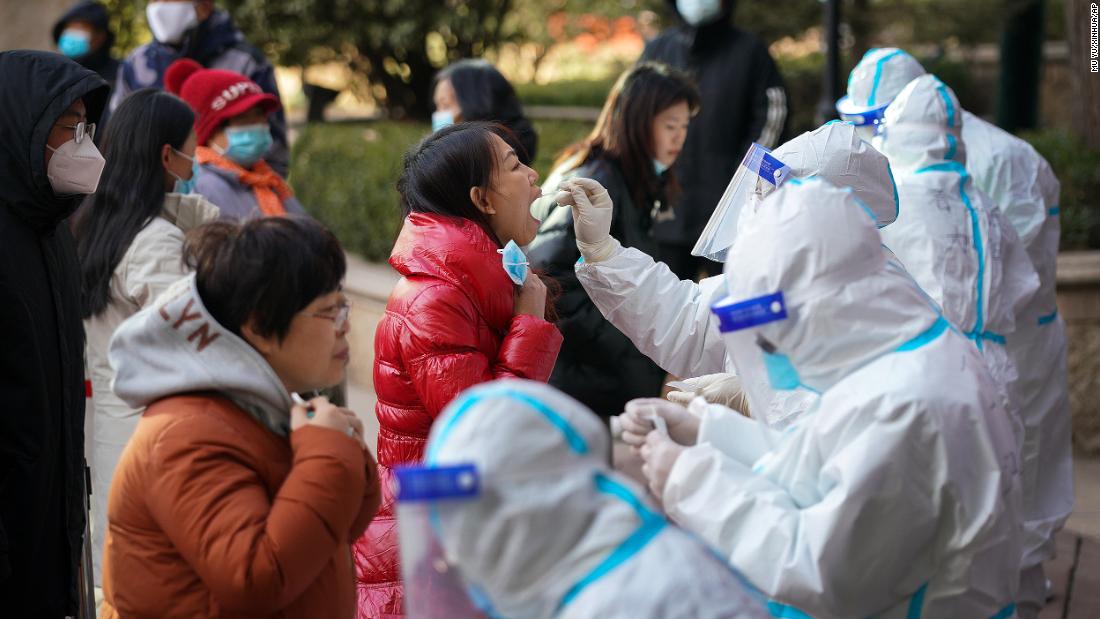The lockdown comes as a total of 117 Covid-19 cases – including 67 asymptomatic cases – were detected in Shijiazhuang on Wednesday. Nationwide, China reported 123 local infections on Wednesday, the highest level since late October.
Official figures showed that since January 2, a total of 304 positive cases of infection were reported in Hebei – most of them in Shijiazhuang. The city is located 180 miles (289.6 kilometers) southwest of Beijing – about three hours by car, or an hour on the high-speed train.
At a press conference Thursday, municipal officials announced an outbound travel ban for all residents and vehicles from Shijiazhuang, except for emergency situations.
Inside the city, gatherings have been banned, all schools have been suspended, and residential compounds and villages have been closed.
The restrictions are some of the steepest in China since the country largely contained the spread of the coronavirus in March. It reminds us of the brutal lockdown during the initial outbreak in the central city of Wuhan, where the coronavirus was first detected in December 2019.
The outbreak in Shijiazhuang comes just weeks before the Lunar New Year holiday, the most important annual festival in China that typically sees millions of people travel home for family reunions.
Last year, the Chinese government shut down Wuhan two days before the Lunar New Year, but millions of people have already left the city, potentially carrying the virus with them to their cities across the country.
This year, fearing that Lunar New Year flights could accelerate the spread of the virus again, a growing number of local governments have advised residents not to travel to their homes for the holiday, as civil servants and employees of state-owned companies have been ordered to stay unless it is private. Consent is given.
Strict procedures
In Shijiazhuang, authorities announced last week that the city was entering “war mode” to fight the spread of the virus. Soon, a citywide coronavirus testing campaign was launched for all of its 11 million residents.
Thursday night, two medical teams – each with about 100 members – carrying test kits and other equipment from the eastern provinces of Jiangsu and Zhejiang were dispatched to Shijiazhuang to assist in the effort.
In addition, a hospital in the city has been disinfected and designated to treat Covid-19 patients, with three more hospitals on standby, Meng said.
Rapid and aggressive measures, such as mass testing, intense contact tracing and strict lockdowns, have determined China’s response to sporadic domestic disease outbreaks.
Last October, the eastern coastal city of Qingdao tested more than 10 million people in just four days over a dozen locally transmitted cases.
In late October, Xinjiang’s westernmost province of Kashgar conducted mass testing of nearly 5 million people and imposed lockdown measures after one reported asymptomatic coronavirus case.
Potentially weak link
But this time, some public health experts in China said that the re-emergence of the virus in Shijiazhuang was detected too late, with a weak link from rural areas in epidemic prevention and control.
The first confirmed case was detected on January 2 – a 61-year-old villager on the outskirts of Shijiazhuang. In the following days, the majority of new cases were discovered in villages in the same area.
Lu Hongzhou, co-director of the Shanghai Center for Public Health at Fudan University, told the state-run Global Times newspaper that the Shijiazhuang outbreak shows that villages are a weak link.
As the virus spread silently, the villagers continued to participate in the gatherings. The report said local health authorities had found that many of the infections were linked to funerals, weddings and other social gatherings.
“Aside from wedding banquets, some villagers also hold religious activities at home every Wednesday, Friday and Sunday, or at least twice a week, in which dozens of people, most of them elderly, have participated in it,” said a local official from Shijiazhuang Village, which was the epicenter of the Shijiazhuang outbreak. Saying.
CNN’s Beijing office attributed to the reports.

“동민은 커피에 대한 깊은 지식을 갖춘 전문가로, 다양한 커피 블렌드와 추출 방식에 대한 연구를 해왔습니다. 게임 세계에서도 그의 이름은 잘 알려져 있으며, 그의 취향은 다양한 게임 장르를 아우릅니다. 알코올과 특히 베이컨에 대한 그의 열정은 독특하며, 다양한 행사와 이벤트의 주최자로서 그의 통찰력은 뛰어납니다.”





